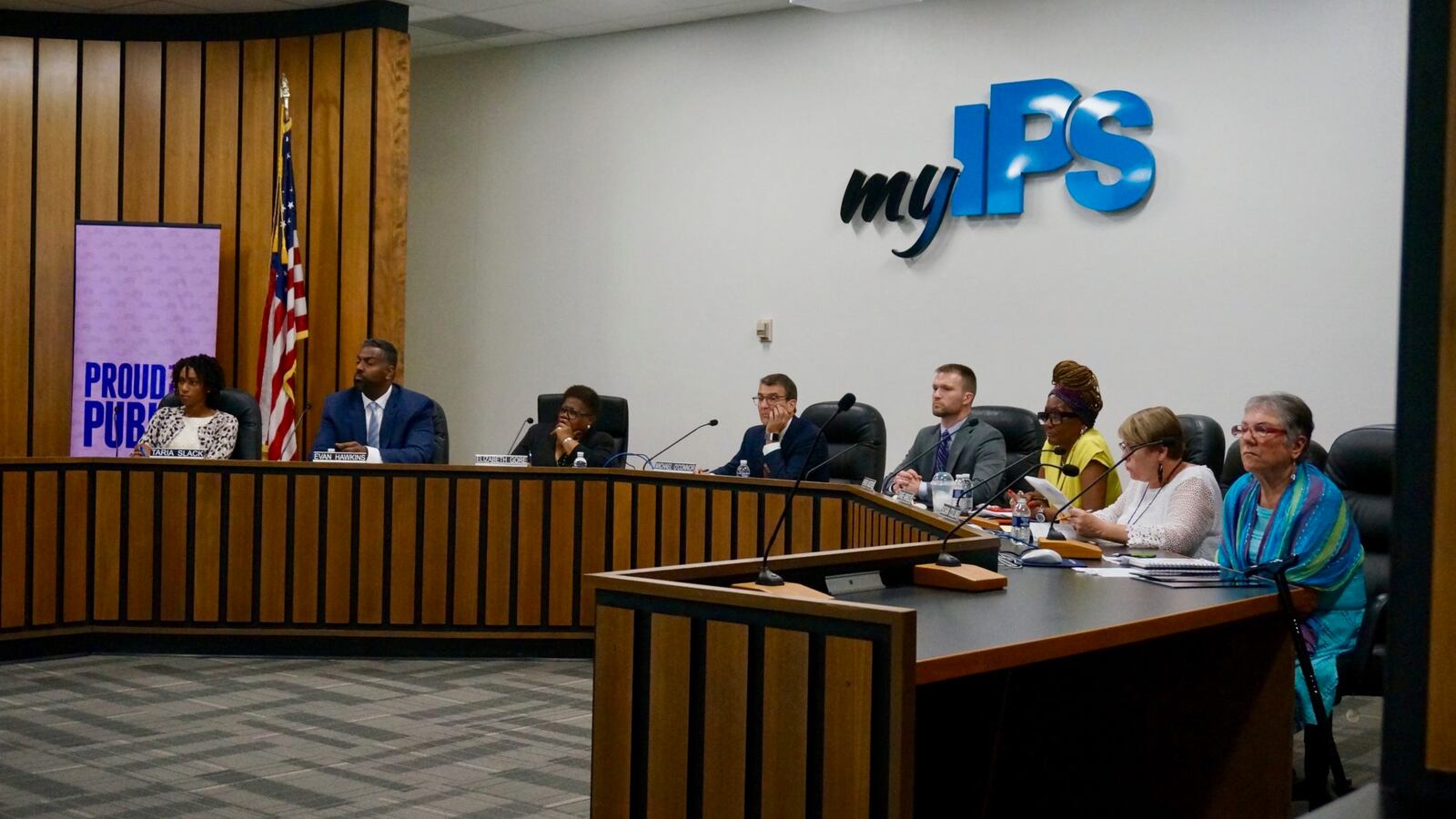Indianapolis Public Schools board members will choose the next superintendent from among three starkly different candidates, and during public interviews Tuesday, the differences were apparent in their style and approach, but not necessarily their policy views.
At a podium facing the school board members — with about 75 parents, educators, and community members at their backs — each of the finalists made a final appeal to the board before answering members’ questions.
What is next for the district’s innovation schools, which are managed by outside operators and have grown rapidly, is one of the most significant questions facing Indianapolis Public Schools. Many local parents, teachers, and education advocates are divided over whether the strategy is improving outcomes for students. All three finalists walked a fine line on the issue — neither taking a strong position in favor or against innovation schools.
Indianapolis Public Schools has said it hopes to name a new superintendent from among the finalists by the end of June. The three top contenders, who were announced last week, were chosen from among 11 applicants for the position. They are the district’s interim Superintendent Aleesia Johnson; Pike Township Assistant Superintendent of Elementary Education Larry Young; and Devon Horton, who serves as chief of schools for Jefferson County Public Schools in Louisville, Kentucky.
Johnson, who has worked for Indianapolis Public Schools for four years, has given countless presentations at the same podium where she and the other finalists were being interviewed. She worked her home-court advantage — touching on ongoing changes, such as new tests and a new curriculum being piloted this year. Because Johnson did not need to prove she knows the district, she was able to step back and focus on big-picture goals and her leadership style.
“I don’t know if you’ll find another candidate who believes as deeply and as personally and as passionately as I believe what’s possible for our district,” she said. “I just ask you for the opportunity to keep going, because I know we can do it.”
Johnson repeatedly emphasized the importance of building a strong team of colleagues, giving people autonomy to do their jobs, and celebrating their successes.
“We cannot become a district that’s going to be high-performing if we’re not valuing the people that we have on our team,” she said.
Young, of Pike Township, has strong ties to Indianapolis education leaders. He was calm in his demeanor and focused many of his answers on the importance of supporting teachers.
Pike is a diverse district that serves many children of color and students from low-income families. But the board’s questions hinted at how Young will translate what he has learned in Pike to Indianapolis Public Schools, which faces a unique set of challenges, such as stiff competition from charter schools.
A question submitted by a community member asked how Young would improve the district’s reputation. He responded: “We have to have excellent schools and we need ambassadors to go out there and talk about the great things that are happening in our schools. That’s what we’ve done in Pike Township, and it’s worked.”
Horton, from the Louisville district, seemed to recognize that as an outsider, he needed to prove that he is familiar with Indianapolis and committed to the district.
A native of Chicago, Horton had clearly done extensive research on Indianapolis and its schools. He reeled off state letter grades for schools, discussed the number of campuses, and offered details about Indianapolis Public Schools programs. He also worked to spin his experience in three school districts, which might have been a disadvantage, as a positive because it provided him insight into different leadership styles.
Horton has recently been named a finalist for two other superintendent jobs but was not ultimately hired. That has led some people to speculate that he might be using Indianapolis as a rung on his career ladder, and Horton addressed that concern with candor at the end of the interview.
“If there’s any concern about me moving around, I’m not chasing the next big thing,” Horton said. “I want to be a superintendent. And there are certain districts that I target that I see a good match — that I feel are a good match for me.”
Board members immediately went into executive session following the interviews. The next steps in their hiring process remain unclear.
The candidates are vying to replace former Superintendent Lewis Ferebee, who led Indianapolis Public Schools for six years before leaving in January to become chancellor of the Washington, D.C., school system.
During Ferebee’s tenure, Indianapolis Public Schools went through a radical transformation. The district launched innovation schools, thus drawing national attention to Indianapolis’its 31,000 students.
Johnson, who previously worked in a charter school and helped create the innovation program, said that innovation should be one of the strategies for improving struggling schools, and echoed a common refrain that she wants a high-quality school in every neighborhood.
Despite his background in a more traditional district, Young’s take on innovation schools was similarly middle of the road: “I’m not pro- nor am I anti-charter or innovation schools. I’m about quality learning experiences for students,” he said.
Horton, however, had a more divided position on innovation schools. He suggested that while district charter partnerships were working, he might not support continuing to overhaul failing schools with innovation partners.
The district has not revealed how much the next superintendent will make, but Ferebee was paid nearly $300,000 per year, including perks, when he left Indianapolis.

